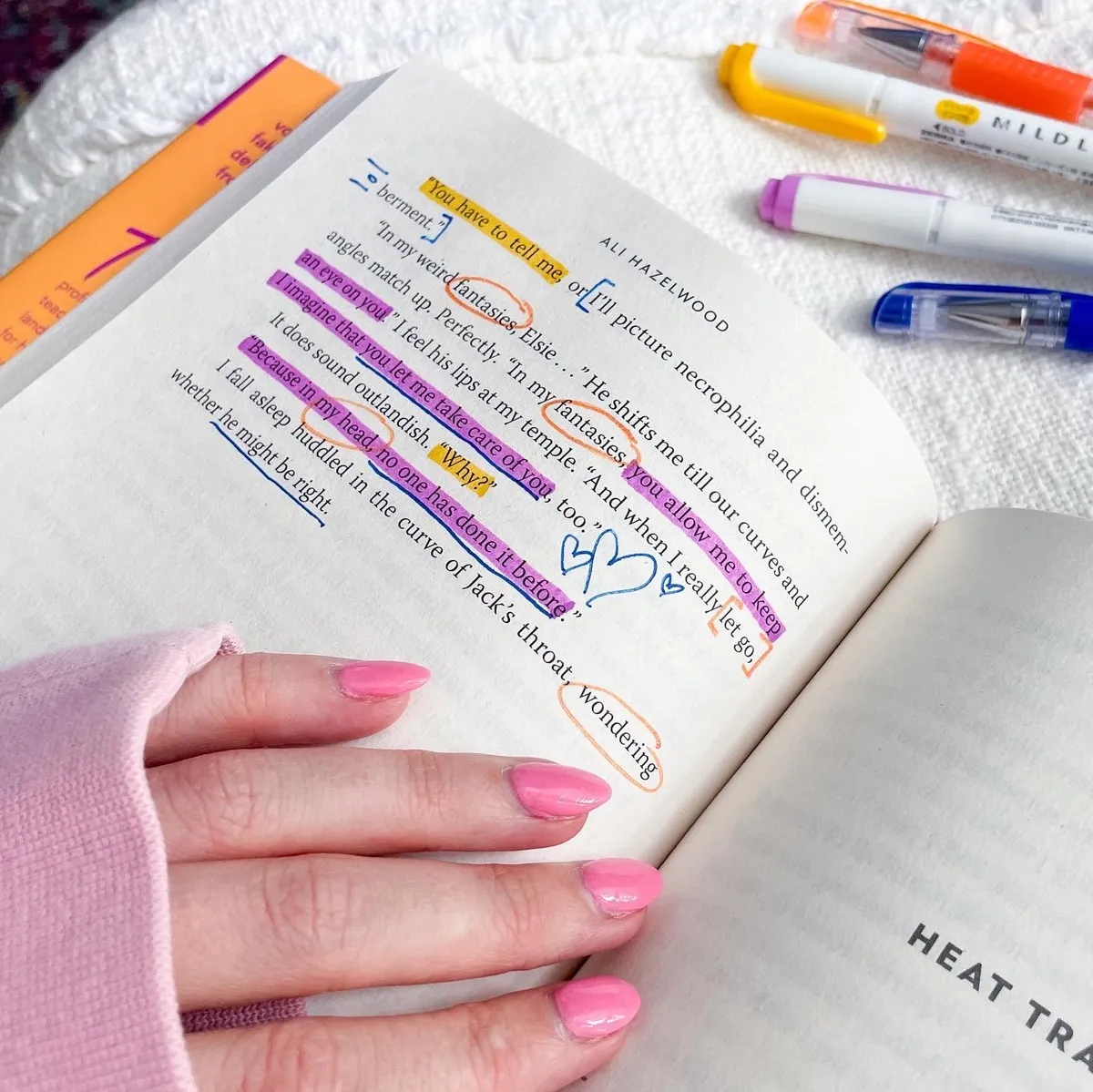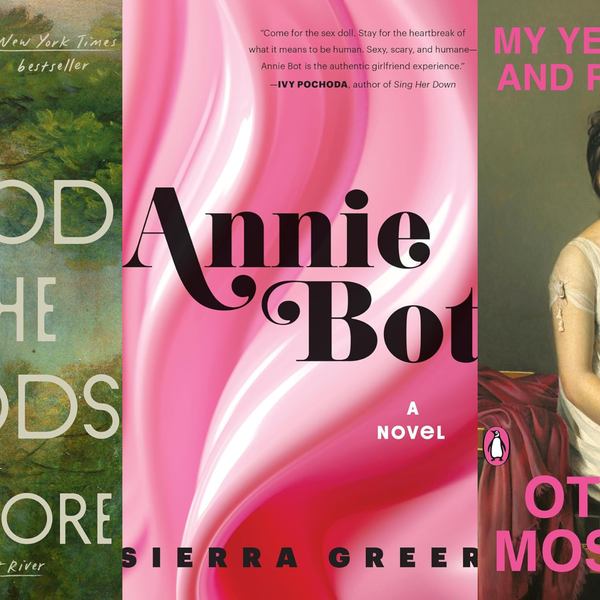Say hello to the new bullet journaling.
How To Annotate A Book, And Why It's Good For Your Mental Health

Chloe Williams serves as B+C’s Entertainment Editor and resident Taylor Swift expert. Whether she’s writing a movie review or interviewing the stars of the latest hit show, Chloe loves exploring why stories inspire us. You can see her work published in BuzzFeed, Coastal Review, and North Beach Sun. When she’s not writing, Chloe’s probably watching a Marvel movie with a cherry coke or texting her sister about the latest celebrity news. Say hi at @thechloewilliams on Insta and @popculturechlo on Twitter!
Learning how to annotate a book is way more fun than it sounds, I promise! While annotating was a requirement in many schools, choosing to do it on your own (and with plenty of colorful supplies, of course) turns it into a fun project, rather than a chore. Whether you've read Colleen Hoover's It Ends With Us a dozen times or you're trying out the newest viral rom-com (hello You, Again!), annotating lets you engage with your favorite fictional characters in a whole new way. That's why I talked to two readers — Li Bing (@lislibrary on YouTube) and Kathrin Hennigan (@abitbooked on Instagram) — about why you should learn how to annotate a book and why it's actually super good for your mental health.
"Reading allows me to experience new worlds and perspectives," Hennigan says. "Growing up as an only child, I found reading especially meaningful for times when I was alone. This has translated into adulthood, making reading both something that pushes me to grow while also providing comfort."
"I read [for] entertainment, an intellectual challenge, to connect with others, or to learn," Bing agrees. "Sometimes in this era of everything digital, reading can seem antiquated. But I strongly believe that the written word can capture and create stories in a way that something audio/visual cannot. There is something to be said about the physical experience of sitting down with a book, turning the pages, and savoring a story over the course of weeks."
If you're a book lover who's always looking to expand your reading experience, then you've come to the right place! Similar to the way Powerpoint Parties, theories, and author interviews help us get to know stories more intimately, annotating gets into the nitty gritty of understanding the internal workings of a character. And it might just teach you something new about yourself, too.
How do you annotate a book?

Images via Li Bing/@lislibrary on Instagram
"I annotate as I read by always making sure I have a pen/pencil/highlighter in my hand," Bing says. The only books she doesn't write in are special editions, books that belong to other people, or library books. "I’m so glad to have certain passages from my favorite books easily accessible. I do a lot of self-reflection."
Hennigan starts by choosing her tools, annotating plan, and the categories she's looking for. "Some people like to create categories as they read, which is so fun!" she says. "I like a bit more structure (as a type-A girly), so, I typically annotate for Quotes, Impactful Passages, Romantic Moments, and Details because these are my favorite parts of books. Finally, I start annotating! I will highlight, underline, notate, and doodle throughout the book for passages that speak to me in my preferred categories. I love the balance of creativity and structure that my annotation process provides, and I love how everyone who annotates can create their own process (or just go with the flow!)."
Bing also uses post-it notes, plastic tabs, or even takes pictures of pages she wants to revisit. The kind of book she's reading and why she's reading it will determine how she annotates: "Sometimes I’ll write down quotes and page numbers in my notes app or a physical notebook. Unless I'm annotating for a book club or class, I'll just use whatever is most convenient; there is no system."
The best thing about annotating is that since the experience is totally determined by the way your brain works, what you're looking for, and how you enjoy reading, there's no right or wrong process. If you love internal monologues, underline every time the main character processes new information. Is romance your favorite aspect of a book? Make notes about how the love interests talk about each other, and what that tells you about their personalities. You can also highlight the imagery or motifs the author repeats throughout a book.
What do you need to annotate a book?

You can choose one tool to annotate a book, or use multiple! To get started, here's what you need:
"Some books just have a few underlined passages, while others are covered in pens of all colors and dozens of sticky tabs," Bing says. "Annotating feels creative in the sense that I am coming up with my own responses to the text, in a way curating the parts that I want to hold on to, or make my own, either by writing about them, discussing them, or just rereading them. I also find color coding by theme to be somewhat creative."
Hennigan also loves to color code, and prefers to choose tools that match the cover of the book she's annotating. The aesthetic you create is one of the most fun parts, and picking colorful supplies will make it as fun to look at in the future as it is to annotate in the moment.
"Although I tend to just use one colored highlighter throughout the book, I will assign a uniquely colored tab and pen to each category," Hennigan says. She recommends theShuttle Art Gel Pens and Zebra Pen Mildliner Double Ended Highlighter Set to mark up your books without ripping the pages, or bleeding through them (a very important thing to avoid!)
Is it a good idea to annotate books?

Image via Kathrin Hennigan/@abitbooked on Instagram.
"I annotate because it makes reading feel more purposeful, meaningful, and fun!" Hennigan says. While hustle culture has made it more difficult for Hennigan to just sit down and read, annotating lets her rest while also giving her free time more purpose: "It has helped me to slow down and reflect more than I otherwise would, which I love. I see the biggest impacts from annotation on my creative fulfillment and mindfulness."
"I might choose to annotate books that I predict to be meaningful or impactful," she continues. "I may also annotate books written by my favorite authors (hello, Emily Henry!) or that I predict to be 5 stars. Annotating helps me feel creative because it helps me connect more deeply with the book I’m reading [and] gives me the opportunity to write, color, doodle, and draw in a way that adulthood and my career does not provide. Annotating also helps me dive deeper into my emotions."
Bing loves to annotate because it helps open up her favorite worlds in a way she wouldn't experience otherwise. "I annotate to understand what I read better and to remember what I read," she says. "I like to engage in a conversation with the author and the text by writing directly on it. It's impossible to remember everything I read, but I'm satisfied if I can easily revisit the passages of a book that affected me most."
While annotating is a fun pastime in the moment, it's had lasting impact on Bing's life.
"I've found that the words and ideas I read find their way into my life at some point. Something will happen to me and it will remind me of some passage from One Hundred Years of Solitude or Norwegian Wood, and I'll go grab my book, flip through it, and find the relevant quote I underlined months ago. There’s no way I would remember so much or be able to locate what I was looking for if I didn’t annotate."
Have you been learning how to annotate a book? What's your go-to read right now? Let us know in the comments and check out our 16 Standout Reads From Jenna Bush Hager's Book Club and 14 Must-Reads From The Oprah Winfrey Book Club.
Brit + Co may at times use affiliate links to promote products sold by others, but always offers genuine editorial recommendations.
Lead image via Kathrin Hennigan/@abitbooked on Instagram



















